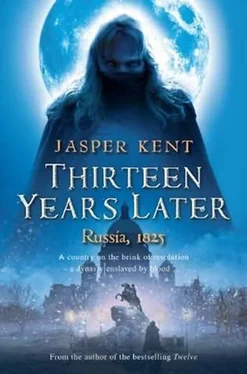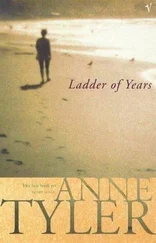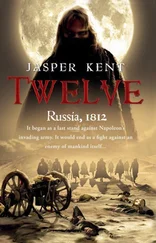The canal disappeared beneath Nevsky Prospekt, under a bridge far wider than it was long. Aleksei turned off the embankment and on to the city’s wide thoroughfare, heading westwards into the setting sun. Ahead of him the yellow-plaster walls of the Admiralty marked the end of the Prospekt, and behind him – several versts behind him – the Nevsky Monastery stood at its beginning. Maks came to his mind less often these days, but was still a frequent visitor. Maks would have been at that meeting tonight, Aleksei was certain – had he lived. He would have been a founder member of the Union of Salvation and would have stuck with it through thick and thin. Some even said he’d have been in charge today, instead of Ryleev. He’d certainly have better understood the implications of what they were planning. Ryleev was just a poet playing at politics.
But Maks had not lived long enough to join with the rest of them in the occupation of Paris in 1814, though he had probably seen the city earlier. The reason Aleksei was so sure Maks would have been a member of the Northern Society was the same one that had condemned him to death in 1812: he was a French spy. The irony of that particular recollection of him – the discussion of Judas and Brutus and Cassius – was that his execution had been carried out by a man who had taken on the name of Christ’s betrayer, albeit in its Russian form – Iuda.
But Iuda too had died, a few months after Maks, and the eleven monstrous creatures that had accompanied him – voordalaki, who drank the blood of Russians and French alike – had perished also. Iuda himself had been no vampire, but he had been in good company with them. Whatever it was that had driven him to inflict suffering on his fellow man was something more perverse than the mere need for blood, but just as despicable. He was dead though, long dead, and his name was no longer of any interest to Aleksei. He turned off the wide avenue and into Great Konyushennaya Street, where his apartments stood. He could see the light from the tall first-floor windows, and the sound of voices already spilled from within.
He climbed the stairs up from the street and entered his home of almost twenty years, dismissing thoughts of the name Iuda from his mind and turning to a different name which, today at least, was of more concern to him. That name was Vasiliy.
* * *
It took Aleksei more than a moment to recognize either his drawing room or his wife. Both had undergone a transformation that was evidently intended to please the evening’s guests. On consideration, Aleksei preferred what Marfa had done with herself to what she had done with the room. Usually their home was tidy and simple, its comfortable size and central location being expression enough of the degree of wealth required to maintain it. Today, however, it seemed everything they owned was on show. The best crockery and cutlery covered every available flat surface, far more than was needed for the number of guests expected. The only exception was the harpsichord, which neither he nor Marfa would ever dare sully with such clutter.
Marfa herself had opted for simplicity, and a beautiful simplicity at that. She wore a cream satin dress, decorated with only a few tasteful blue ribbons. Her hair was up, adorned with a silver tiara. She was going to be forty in a month’s time, but few would suppose it. The fact that she was a little plumper than when he had first known her only served to hide any wrinkles she might have developed. Her hair was still the same dark chestnut it had always been, and few other than her maid and Aleksei himself would have guessed at the efforts she made to keep it so.
He bent forward to kiss her on the cheek and she stepped away from the woman she had been speaking with – whom Aleksei did not recognize – to talk to her husband.
‘Have you seen Dmitry?’ she asked.
‘Is he not here yet?’
‘I wouldn’t have asked if he was.’ Her voice revealed the mild, familiar irritation born of a long marriage.
‘He’ll be here,’ said Aleksei, kissing her again. ‘He loves his mother.’
He almost pushed her back to her conversation and turned to eye the room, ostensibly looking for anyone to talk to, but in fact looking for one guest in particular.
My Darling Vasya…
The rest of the letter had made clear that there could be no mistaking what Marfa had meant by ‘darling’. Aleksei had found the letter, unfinished, folded inside a copy of Diderot’s La Religieuse in her writing desk two nights before. It was not the kind of book he would have expected her to read – and he knew she would never have expected him to glance at it, which was perhaps why she had trusted it as a safe hiding place. He had not been deliberately spying on her – in fact, he’d been trying to find inspiration for a gift for her upcoming birthday – but espionage was his profession, and so when he had found the letter, he had not hesitated to read it.
There were three Vasiliys at the party, though Aleksei did not know the names of all the men present. He had known none of them ever to use the diminutive ‘Vasya’. Vasiliy Pyetrovich was a soldier, like himself – a major in the Moskovsky regiment. He had married only six months before, and his wife, who clutched his hand and never moved from his side as they circulated amongst the guests, was clearly showing the rapid results of their union. Vasiliy Andreevich was a chinovnik in the Admiralty, with a reputation as a womanizer. Indeed, Aleksei had met his latest mistress; she was twenty-two years old and stunningly attractive. With all respect to Marfa, Aleksei doubted that she would have caught Vasiliy Andreevich’s eye. Vasiliy Borisovich was a striking fifty-year-old of no profession. He lived off his family’s estate of five thousand souls – described in the Russian manner of the number of serfs owned, where in the West, as Aleksei well knew, his wealth would be measured by area of land. But however wealthy and attractive he might be, he was an unlikely match for Marfa; he was – as most in the room knew and few cared – a homosexual.
Besides, Marfa’s letter had given Aleksei no reason to suppose that Vasiliy would be attending the party. That she wrote to him at all might imply that he did not live in Petersburg, though there had been no clue as to an address.
‘You know Yelizaveta Markovna, don’t you, Lyosha?’ Marfa’s question distracted him from his thoughts. He turned to see the woman he was being introduced to.
‘Of course I do,’ he replied with an enthusiasm that belied the haziness of his memory of the woman. ‘Delighted to see you again.’
‘You too, Colonel Danilov. You must be so proud of Dmitry Alekseevich’s commission,’ said Yelizaveta Markovna, in a voice whose pitch wavered randomly, as though she were almost uncontrollably excited. ‘We always said he’d make a soldier – just like his father.’
Aleksei smiled and nodded politely. ‘Very proud,’ he said, wondering why his voice so utterly failed to convey the sincerity of his feelings. Perhaps it was Yelizaveta Markovna’s mistaken conception that Dmitry was entering the same profession as Aleksei. Aleksei knew he had not been a real soldier for a very long time. He noticed both Marfa and Yelizaveta Markovna looking at him, expecting him to say more, but suddenly their heads turned away from him, across the room, to the source of a sound.
It was the harpsichord; the first notes of a sonata by Mozart. The fingers that danced over the keys, deftly sounding melody and countermelody, belonged to Dmitry. He had not announced himself to his parents, but had headed directly for his favourite seat. All in the room gravitated towards him. Aleksei stood at the back of the crowd, scarcely able to see his son, but listening intently. It was a beautiful sound, but what impressed him even more than the music was the easy charm with which Dmitry engaged his listeners. Aleksei was no musician, but if he had been, then playing even the simplest piece would have taken his attention utterly. In contrast, Dmitry smiled at his audience, laughed at their comments and even replied to their questions. When he moved to a new piece – Scarlatti this time – he did so as if it had been a request rather than his own choice, though Aleksei had heard requests only for more Mozart and a few for Beethoven. He was, Aleksei knew well, a showman – something Aleksei could never be. He envied his son for it, but also saw how it could be a weakness, how it would mean that Dmitry would never be a great musician.
Читать дальше












